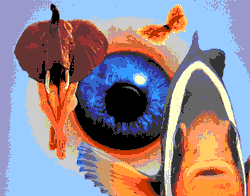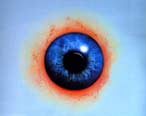By Jennifer A. Singh, YPP

Sweet dreams are made of this? Really?
It’s 6:58 a.m…Nadia furiously slaps the alarm and snuggles back under thick covers.
 “Forget my Biology class.” she thinks. Her only concern is to get back to the dream she was having. She tries to slip back into sleep, but can’t. Giving up, she struggles out of bed, pondering the vivid dream of a friend hobbling on crutches.
“Forget my Biology class.” she thinks. Her only concern is to get back to the dream she was having. She tries to slip back into sleep, but can’t. Giving up, she struggles out of bed, pondering the vivid dream of a friend hobbling on crutches.
Two weeks later Nadia almost drops the phone when she hears that the same friend just broke his leg skiing. This was not the first time one of her dreams had become a reality.
“I have psychic dreams all the time,” says Melissa, a friend who seems to share the same gift, “but I have no control of them so I can’t use them to my advantage.”
Okay. Wait a minute. Does anyone actually believe that dreams can accurately forecast the future?
“Dreams are fantasies, hopes, aspirations and one’s infatuations,” states Nandy. “Everything is just transformed into confusing symbols and metaphors.”
Natalie doesn’t see psychic potential in them, “There are so many dreams that I’ve had, and there is no possibility of them coming true. The dreams I have are absurd, they are all superficial.”
 Many people suggest dreams represent fears and insecurities…even unconscious ones. Repressing emotions (such as anxiety for next week’s job interview) or natural impulses (a secret crush that is being denied) can result in terrifying dreams, or nightmares. The following morning most sufferers only remember a frightening image.
Many people suggest dreams represent fears and insecurities…even unconscious ones. Repressing emotions (such as anxiety for next week’s job interview) or natural impulses (a secret crush that is being denied) can result in terrifying dreams, or nightmares. The following morning most sufferers only remember a frightening image.
“Every January, after New Years, I have a dream of the world ending—I’ve had it since I was 13,” states Natasha, now 19. “I’m at a fair, with a Ferris wheel, cotton candy, clowns. It starts to get very dark and then the ground starts to shake. I don’t know who I’m with, I never recognize anyone around me. People start running to hide near buildings and crevices. Then I always hide in a green canoe with white Arabic or Hindu writing on it. Suddenly, a set of huge, glowing yellow snake eyes emerges, stop and look around. I always think it’s going to get me first, then I wake up.”
What are dreams full of strange images and cryptic messages trying to say, if anything? Interpretations aside, how does Science explain the phenomenon of dreams?
When asleep, we slip into a dream stage known as rapid-eye-movement or REM sleep. Including the darting of the eyes and fluttering of eyelids, many other changes occur physically. Because the brainstem blocks incoming messages from the body we basically become paralysed. Not only does heart rate increase and breathing become irregular but the genitals become aroused. With the exception of a frightening dream, the genitals become aroused even if the dream contains no sexual content.
 Despite many who claim: “I never dream,” deprived of REM sleep, one would begin to display psychotic behaviour. REM sleep produces experiences that are recalled as confusing images, distorted figures and numerous irrational scene changes. We call these dreams, and they are normal and necessary for human functioning.
Despite many who claim: “I never dream,” deprived of REM sleep, one would begin to display psychotic behaviour. REM sleep produces experiences that are recalled as confusing images, distorted figures and numerous irrational scene changes. We call these dreams, and they are normal and necessary for human functioning.
Sigmund Freud and Carl Jung were psychologists who contributed significantly to the study of dreams.
Freud pioneered investigation into the human subconscious, claiming that dream content came from the unconscious mind and images that appear in dreams are often connected with sexual repression.
To Freud, any elongated object like a cigar or a tower in a dream represented the penis. He concluded that a woman dreaming of such things had a subconscious desire for sex. Freud was also convinced that many images represented women’s genitals: a woman’s hat, ear, eye, mouth…even complicated machinery and apparatus.
While Freud saw the unconscious as something of a garbage dump of sexual desire, Jung felt it was a storage place for spirituality and imagery. This is evident in his different interpretation of dreams.
 Jung divided symbolism in dreams into two categories: personal and collective. Personal symbolism comes from memories of objects, people and events. Collective symbolism intertwines memories with the shared experiences of a family, tribe or nation.
Jung divided symbolism in dreams into two categories: personal and collective. Personal symbolism comes from memories of objects, people and events. Collective symbolism intertwines memories with the shared experiences of a family, tribe or nation.
Primitive and ancient cultures viewed dreams as of great importance. Especially in the area of mythology and religion, dreams were often considered prophetic.
The Mojave and Kiowa American Indian people believed dreams endowed supernatural abilities for fighting and hunting. Similarly, in the ancient pagan world it was believed that God sent inspirational dreams to aid survival and to cure the sick.
A set of sacred books in India, the Vedas, written over 3000 years ago, tries to interpret the meanings of certain images in dreams. For example, riding an elephant in a dream is considered good luck while riding a donkey is a bad omen. Every dream possibly holds a great deal of significance, whether paranormal or not. There is a famous Talmudic statement from Rabbi Hisda: “A dream that hasn’t been interpreted is like an unread letter.”
Take the sinking of the Titanic. Many individuals dreamt of the event before it happened. A businessman experienced reoccurring dreams of the Titanic floating on its side, but did not cancel his passage on the “unsinkable” ship until his business plans changed.
Another disaster in the Welsh mining village of Aberfan was foreseen through a dream. A little girl confided in her mother about her reoccurring dream: something dark has fallen on the school, but she wasn’t afraid to die because she is with her friends. A few days later the school was buried after a coaltip slid down a mountain. One hundred and forty four died, including the little girl and her friends.
 These kind of precognitive dreams could theoretically save lives, but as Aliya points out, it is hard to believe in this kind of psychic phenomena, “If someone told me they dreamt our school was going to catch a fire, I wouldn’t take them seriously.”
These kind of precognitive dreams could theoretically save lives, but as Aliya points out, it is hard to believe in this kind of psychic phenomena, “If someone told me they dreamt our school was going to catch a fire, I wouldn’t take them seriously.”
As Nadia puts her head down for another night of adventure, an exploration into her subconscious that will reveal all of her deepest desires, she can only wonder what the unexplainable forces will deliver tonight.
So, tuck right in and sweet dreams.

What Do You Think? Leave A Comment!